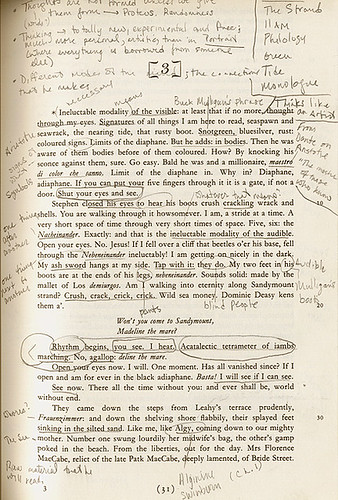In February I wrote a short defense of marginalia. To me, marginalia makes used books more interesting and borrowed books more personal (let me be clear I don't write in books I borrow - I am referring to my own books that I borrow out, or books I borrow from others who have written their own annotations). It marks ownership and reveals reader's nuances. It's also a way of connecting and responding to the author - alive or dead.
Recently I stumbled across an article in New York Times Magazine that made me quite happy: "What I Really Want Is Someone Rolling Around in the Text", in which Sam Anderson writes a longer, much more eloquent defense of marginalia,
This wasn’t exactly radical behavior — marking up books, I’m pretty sure, is one of the Seven Undying Cornerstones of Highly Effective College Studying. But it quickly began to feel, for me, like something more intense: a way to not just passively read but to fully enter a text, to collaborate with it, to mingle with an author on some kind of primary textual plane.Then he touches on a ereader fantasy that I found quite interesting. With the advent of ereaders, we have a way of gathering the marginalia that is found written in physical books, most notably the best and most intelligent marginalia written by famous authors and literary critics, and offering the readers an option of viewing this marginalia on their ereader. In short, the ability to read notes from "history's most interesting book markers". He calls this a sort of "readerly utopia" and I couldn't agree more. Amazon has already got something in the works that will enable public note sharing on its Kindle, which may suggest Anderson's fantasy isn't so distant.
For those of you that abhor marginalia (I remember quite a few of you from my last defense) rest assured this feature wouldn't affect your reading experience. As Anderson explains,
I understand the objection, but in the world of e-books, marginalia would be purely value-added, appearing and disappearing at the touch of a button. It would be like the option of watching a film with the directors’ commentary — a nice bonus but also easy to ignore. And it would allow a whole new wave of readers to discover the pleasure of the words in the margins.Now that people, that would give me reason enough to buy an ereader.


You can put notes on an eBook, you can't write on it but that will come also.
ReplyDeletehttp://www.ManOfLaBook.com
Man, Yes I've got a feeling it will. Especially since Amazon has already got something in the works that will enable public note sharing on its Kindle.
ReplyDeleteThat would be awesome! I would love to see other's thoughts on famous classics.
ReplyDeleteThe ereader's new innovations sound perfect for both marginalia "haters" to embrace it. And, wow, reading the notes of writers about my favorites books sounds like an amazing opportunity. :)
ReplyDeleteHis "e-reader utopia" idea for marginalia seemed really cool. I don't own an e-reader and am currently marking up Infinite Jest quite a bit- I hesitated first because it is a hardcover but realized I would be missing out on something if I couldn't jot down words or ideas or names I need to remember.
ReplyDeleteWonderful post, Brenna! I don't write on the books I read, but I highlight my favourite sentences and passages.
ReplyDeleteYour post also makes me remember Fermat's Last Theorem, about which the mathematician Pierre Fermat wrote in the margin of his book - that the proof was easy but the margin was not enough to write it out. Mathematicians after him spent centuries trying to find the elusive proof :)
I'm not sure how I didn't see this post earlier. I'm not a big fan of the notes sharing on kindle (when I get back to the states I plan to keep my kindle's wireless off to avoid getting tangled up in that) and although I love my OWN marginalia, I have very mixed feelings on uncovering other people's. Sometimes, sure, the notes and markings of a good reader can help me find my own way through a novel and give me some interesting insight into what other readers have thought...but more often it frustrates me, doesn't open any part of the novel up for me, and is impossible for me to tune out. That said, I think that I'm right now so frustrated with the idea of finding marginalia in used books mostly because I'm reading a story collection with the Worst Marginal Notes Ever.
ReplyDelete-- Ellen
hello! i found your blog on 'what red read' and quite enjoy this article about marking up books! :D mortimer adler believes you don't 'own' a book until you've marked it up!
ReplyDeletehttp://academics.keene.edu/tmendham/documents/AdlerMortimerHowToMarkABook_20060802.pdf
I've actually found that having a Sony Reader means that I'm suddenly taking notes when I otherwise might not have. This is partly from a practical standpoint - the Reader is equipt such that I can always take notes whereas I often find myself lacking in pens when there's something of note in a print book - but also because of my fear of "ruining" my books. I like the look of marginalia, but I can't bring myself to take part. With my Reader, it doesn't feel like a permanent "ruin". A quite nice solution.
ReplyDelete